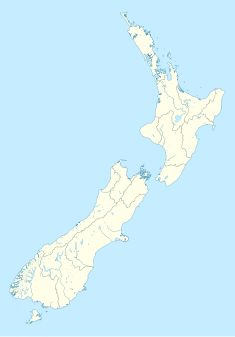Takiroa Rock Art Shelter
| Takiroa Rock Art Shelter | |
|---|---|
 | |
| Type | Rock art |
| Location | Canterbury, New Zealand |
| Coordinates | 44°50′34.41″S 170°38′41.91″E / 44.8428917°S 170.6449750°E |
| Designated | 16 April 1985[1] |
| Reference no. | 5653 |
The Takiroa Rock Art Shelter is an archaeological site located along State Highway 83 near Duntroon, New Zealand.[2] The site features a limestone rock shelter containing several pieces of Māori rock art, dating between 1400 and 1900 AD.[3] The shelter is open to public viewing, with fences constructed to protect the artwork from damage.
Rock art
[edit]The Takiroa Historic Area features several Māori drawings made from ochre, bird fat, and charcoal.[2][3] The subject matter present in the shelter is variable. Some drawings have been interpreted as people and animals, such as birds.[4] Depictions of European settlers are also apparent, which feature the likes of horses and ships.[4]
- Examples of Māori rock art at Takiroa
History
[edit]Several pieces of artwork were removed from the rockface around 1913 for display in museum collections.[3][5] Fences were erected in 1930 and 1964 in order to prevent damage to the artwork by livestock and visitors, however these measures were generally ineffective.[3] Heritage New Zealand (then known as the New Zealand Historic Places Trust), which managed the shelter, listed it as a Category II Historic Place in 1985.[1] Under the Ngāi Tahu Claims Settlement Act 1998, the Crown vested administration of the shelter to Te Rūnanga o Ngāi Tahu.[6]
In May 2010, a large portion of overhanging rock at the Takiroa Shelter fell, destroying the protective fences but leaving the rock art relatively unscathed.[7] The shelter was subsequently closed to the public until March 2012, after repairs were completed.[8]
References
[edit]- ^ a b "Takiroa Rock Art Site". Heritage New Zealand. Retrieved 30 May 2019.
- ^ a b McKinnon, Malcolm (29 July 2015). "Otago places – North Otago". Te Ara – the Encyclopedia of New Zealand. Retrieved 30 May 2019.
- ^ a b c d "Takiroa Rock Art Shelter". New Zealand History. Ministry for Culture and Heritage. 22 December 2014. Retrieved 30 May 2019.
- ^ a b Hamel, Jill (2001). The archaeology of Otago (PDF) (Report). Department of Conservation. p. 60. Retrieved 30 May 2019.
- ^ O'Regan, Gerard (2007). "The shifting place of Ngai Tahu rock art". In Clark, Geoffrey; Leach, Foss; O'Connor, Sue (eds.). Islands of Inquiry: Colonisation, seafaring and the archaeology of maritime landscapes. Terra Australis 29. ANU Press. ISBN 9781921313905.
- ^ Ngāi Tahu Claims Settlement Act 1998 (Act). New Zealand Parliament. 1 October 1998.
- ^ Cox, Simon (2010). Rock fall at the Takiroa rock art site, May 2010, Duntroon, North Otago, New Zealand (PDF) (Report). GNS Science. Retrieved 30 May 2019.
- ^ Bruce, David (3 March 2012). "Rock art site reopens". Otago Daily Times. Retrieved 30 May 2019.




